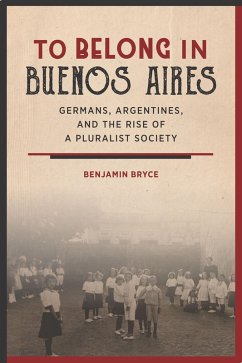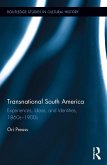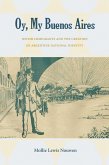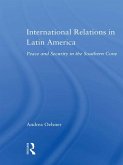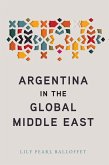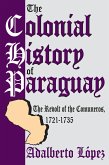To Belong in Buenos Aires (eBook, ePUB)
Germans, Argentines, and the Rise of a Pluralist Society


Alle Infos zum eBook verschenken

To Belong in Buenos Aires (eBook, ePUB)
Germans, Argentines, and the Rise of a Pluralist Society
- Format: ePub
- Merkliste
- Auf die Merkliste
- Bewerten Bewerten
- Teilen
- Produkt teilen
- Produkterinnerung
- Produkterinnerung

Hier können Sie sich einloggen

Bitte loggen Sie sich zunächst in Ihr Kundenkonto ein oder registrieren Sie sich bei bücher.de, um das eBook-Abo tolino select nutzen zu können.
In the late nineteenth and early twentieth centuries, a massive wave of immigration transformed the cultural landscape of Argentina. Alongside other immigrants to Buenos Aires, German speakers strove to carve out a place for themselves as Argentines without fully relinquishing their German language and identity. Their story sheds light on how pluralistic societies take shape and how immigrants negotiate the terms of citizenship and belonging.
Focusing on social welfare, education, religion, language, and the importance of children, Benjamin Bryce examines the formation of a distinct…mehr
- Geräte: eReader
- mit Kopierschutz
- eBook Hilfe
- Größe: 8.72MB
![Transnational South America (eBook, ePUB) Transnational South America (eBook, ePUB)]() Ori PreussTransnational South America (eBook, ePUB)34,95 €
Ori PreussTransnational South America (eBook, ePUB)34,95 €![Oy, My Buenos Aires (eBook, ePUB) Oy, My Buenos Aires (eBook, ePUB)]() Mollie Lewis NouwenOy, My Buenos Aires (eBook, ePUB)40,95 €
Mollie Lewis NouwenOy, My Buenos Aires (eBook, ePUB)40,95 €![International Relations in Latin America (eBook, ePUB) International Relations in Latin America (eBook, ePUB)]() Andrea OelsnerInternational Relations in Latin America (eBook, ePUB)38,95 €
Andrea OelsnerInternational Relations in Latin America (eBook, ePUB)38,95 €![Argentina in the Global Middle East (eBook, ePUB) Argentina in the Global Middle East (eBook, ePUB)]() Lily Pearl BalloffetArgentina in the Global Middle East (eBook, ePUB)26,95 €
Lily Pearl BalloffetArgentina in the Global Middle East (eBook, ePUB)26,95 €![The Colonial History of Paraguay (eBook, ePUB) The Colonial History of Paraguay (eBook, ePUB)]() The Colonial History of Paraguay (eBook, ePUB)36,95 €
The Colonial History of Paraguay (eBook, ePUB)36,95 €![Buenos Aires: The Biography of a City (eBook, ePUB) Buenos Aires: The Biography of a City (eBook, ePUB)]() James GardnerBuenos Aires: The Biography of a City (eBook, ePUB)6,99 €
James GardnerBuenos Aires: The Biography of a City (eBook, ePUB)6,99 €![Forging Ties, Forging Passports (eBook, ePUB) Forging Ties, Forging Passports (eBook, ePUB)]() Devi MaysForging Ties, Forging Passports (eBook, ePUB)26,95 €
Devi MaysForging Ties, Forging Passports (eBook, ePUB)26,95 €-
-
-
Focusing on social welfare, education, religion, language, and the importance of children, Benjamin Bryce examines the formation of a distinct German-Argentine identity. Through a combination of cultural adaptation and a commitment to Protestant and Catholic religious affiliations, German speakers became stalwart Argentine citizens while maintaining connections to German culture. Even as Argentine nationalism intensified and the state called for a more culturally homogeneous citizenry, the leaders of Buenos Aires's German community advocated for a new, more pluralistic vision of Argentine citizenship by insisting that it was possible both to retain one's ethnic identity and be a good Argentine. Drawing parallels to other immigrant groups while closely analyzing the experiences of Argentines of German heritage, Bryce contributes new perspectives on the history of migration to Latin America-and on the complex interconnections between cultural pluralism and the emergence of national cultures.
Dieser Download kann aus rechtlichen Gründen nur mit Rechnungsadresse in A, D ausgeliefert werden.
- Produktdetails
- Verlag: Stanford University Press
- Seitenzahl: 248
- Erscheinungstermin: 16. Januar 2018
- Englisch
- ISBN-13: 9781503604353
- Artikelnr.: 50661235
- Verlag: Stanford University Press
- Seitenzahl: 248
- Erscheinungstermin: 16. Januar 2018
- Englisch
- ISBN-13: 9781503604353
- Artikelnr.: 50661235
Introduction: The Future of Ethnicity
chapter abstract
The introduction discusses the importance of the future in shaping ethnic
communities in Buenos Aires. Underlining the significance of temporality
and the future for the social history of migration offers new perspectives
on how state institutions developed, how a culturally plural society
formed, and how immigrants and families participated in that society.
Ethnicity is an unstable category worthy of analysis in itself, and that,
as a result, ethnic communities should similarly be studied with that point
in mind. The introduction also discusses the transnational turn in German
historiography, which has highlighted how people and ideas outside the
nation-state influenced conceptions of the nation during the Imperial and
Weimar periods. German-speaking immigrants in Buenos Aires actively
embraced the transatlantic relationship that groups in central Europe
sought to establish, but they had their own ideas about their relationship
with their nation of heritage and their nation of residence.
1Social Welfare, Paternalism, and the Making of German Buenos Aires
chapter abstract
This chapter argues that affluent immigrants used various social welfare
institutions to shape the meaning of citizenship in Buenos Aires. Through
German-language social welfare organizations, thousands of immigrants and
second-generation bilinguals gave form to a vision of a German community in
Buenos Aires. The community leaders who offered job placement, health care,
and other services to workers promoted idealized notions of male
breadwinners who supported their families, of productive and healthy
workers, and of respectable female laborers. All of these community
actions, however, were also civic actions, and the ideas of obligation to
working-class immigrants were also ideas about rights and duties for
members of Buenos Aires society. At stake for wealthy speakers of German
was their social, gender, and class power, both within their own community
and in Argentine society.
2Children, Language, and the Rise of a Pluralist Society
chapter abstract
This chapter argues that immigrant teachers and their pupils broadened the
definition of citizenship in Argentina. Those who ran these schools and the
parents who sent their children to them clearly believed that pluralism and
Argentine belonging could coexist. Parents and teachers wanted children and
young adults to grow up with an advanced proficiency in German, alongside
Spanish, and with knowledge about both central Europe and Argentina.
Through their actions and ideas, the children and adults involved with
German-Spanish bilingual schools took an active interest in the future.
Although they had various opinions about the educational project of the
adults involved, Argentine-born children of German heritage grew up in
contact not only with the German language and German culture but also with
the Spanish language and Argentine civic education.
3The Language of Citizenship: Curriculum and the Argentine State
chapter abstract
Drawing from Argentine governmental and German-language sources, this
chapter argues that bilingual schools pushed for a pluralist definition of
citizenship and, in so doing, undermined many of the assimilationist goals
expressed by a small group of Argentine elites. This approach contributes
to a broader discussion of education and state authority in Argentina by
highlighting how state officials attempted to confront cultural pluralism
and how immigrants embraced and modified these efforts. Through a series of
policies, the National Council of Education ensured that bilingual schools
taught the Spanish language and a number of Argentine subjects that would
equip children with civic knowledge for Argentine society. Yet that same
system of regulation allowed immigrant educators to teach children a second
language and other topics related to their parents' countries of origins.
4An Unbounded Nation? Local Interests and Imperial Aspirations
chapter abstract
This chapter argues that German-speaking educators in Buenos Aires took
advantage of transatlantic support from Germany while navigating among
their own interests in community, ethnicity, and belonging in Argentina.
Focusing on the circulation of teachers, the flow of financial support from
Germany, and a system that offered both Argentine and German diplomas, it
offers new perspectives on how constructions of European ethnicity and
Argentine belonging developed in a transnational context. For those in
Germany, supporting schools and maintaining ethnic Germans within a
territorially unbounded German nation reflected the nationalist aspiration
to compete with other European empires on the global stage. For those in
Buenos Aires, however, the same transatlantic relationship was oriented
toward another set of expectations about the future. They instead believed
that European support of German-Spanish bilingual schools would help
educators and families succeed in their goal of pushing for a pluralist,
multilingual society.
5Transatlantic Religion and the Boundaries of Community
chapter abstract
This chapter argues that denominational identities influenced how
German-speaking Lutherans and Catholics in Argentina understood the
boundaries of community and their sense of belonging in Argentine society.
It charts the efforts of Lutheran and Catholic organizations in Germany to
promote German-language religion in Buenos Aires and the Río de la Plata
region, and it examines how these transatlantic ties helped shape some of
the core German-language institutions of Argentina. German speakers
maintained relations with various religious organizations in Imperial and
Weimar Germany, but they drew selectively on this support to foster both
religious and linguistic pluralism in Argentina. Ultimately, support from
Germany came with few strings attached, and it gave German-speaking
Lutherans and Catholics access to German-speaking pastors and priests, as
well as extra financial resources.
6The Language of Religion: Children and the Future
chapter abstract
Immigrant adults participating in organized religion were fundamentally
concerned with the place of their respective churches in Argentina. For
German-speaking Catholics, that often meant using the German language to
strengthen the place of their church in the face of a secularizing state.
Some Lutherans were concerned that a shift from German to Spanish would
prevent a new generation from remaining involved with their parents'
denomination. At the same time, other parents and children remain involved
in religious communities while also demanding services in Spanish. In
striking a balance between German and Spanish in order to create a united
ethno-religious community, Lutheran and Catholic leaders also excluded many
German speakers. The way that they chose to create community blocked out
not only people of other denominations but also anyone who was not
interested in organized religion.
Conclusion: Citizenship and Ethnicity
chapter abstract
Between 1880 and 1930, German speakers in Buenos Aires, together with
hundreds of thousands of other immigrants and their children, created a
framework that defined the relationships among the state, the public
sphere, religious institutions, ethnic organizations, and family that then
evolved throughout the twentieth century. The definitions of German
ethnicity slowly changed in Buenos Aires, as did the nature of the
linguistic and cultural pluralism of Argentine society. Ideas about the
future drove German-speaking immigrants to build and support a range of
institutions. In so doing, however, these immigrants and second-generation
bilinguals created overlapping German communities in Buenos Aires. They
navigated among denominational, linguistic, German, and Argentine
identities. Their ideas and actions about citizenship and belonging helped
give shape to the meaning of ethnicity in Argentina.
Introduction: The Future of Ethnicity
chapter abstract
The introduction discusses the importance of the future in shaping ethnic
communities in Buenos Aires. Underlining the significance of temporality
and the future for the social history of migration offers new perspectives
on how state institutions developed, how a culturally plural society
formed, and how immigrants and families participated in that society.
Ethnicity is an unstable category worthy of analysis in itself, and that,
as a result, ethnic communities should similarly be studied with that point
in mind. The introduction also discusses the transnational turn in German
historiography, which has highlighted how people and ideas outside the
nation-state influenced conceptions of the nation during the Imperial and
Weimar periods. German-speaking immigrants in Buenos Aires actively
embraced the transatlantic relationship that groups in central Europe
sought to establish, but they had their own ideas about their relationship
with their nation of heritage and their nation of residence.
1Social Welfare, Paternalism, and the Making of German Buenos Aires
chapter abstract
This chapter argues that affluent immigrants used various social welfare
institutions to shape the meaning of citizenship in Buenos Aires. Through
German-language social welfare organizations, thousands of immigrants and
second-generation bilinguals gave form to a vision of a German community in
Buenos Aires. The community leaders who offered job placement, health care,
and other services to workers promoted idealized notions of male
breadwinners who supported their families, of productive and healthy
workers, and of respectable female laborers. All of these community
actions, however, were also civic actions, and the ideas of obligation to
working-class immigrants were also ideas about rights and duties for
members of Buenos Aires society. At stake for wealthy speakers of German
was their social, gender, and class power, both within their own community
and in Argentine society.
2Children, Language, and the Rise of a Pluralist Society
chapter abstract
This chapter argues that immigrant teachers and their pupils broadened the
definition of citizenship in Argentina. Those who ran these schools and the
parents who sent their children to them clearly believed that pluralism and
Argentine belonging could coexist. Parents and teachers wanted children and
young adults to grow up with an advanced proficiency in German, alongside
Spanish, and with knowledge about both central Europe and Argentina.
Through their actions and ideas, the children and adults involved with
German-Spanish bilingual schools took an active interest in the future.
Although they had various opinions about the educational project of the
adults involved, Argentine-born children of German heritage grew up in
contact not only with the German language and German culture but also with
the Spanish language and Argentine civic education.
3The Language of Citizenship: Curriculum and the Argentine State
chapter abstract
Drawing from Argentine governmental and German-language sources, this
chapter argues that bilingual schools pushed for a pluralist definition of
citizenship and, in so doing, undermined many of the assimilationist goals
expressed by a small group of Argentine elites. This approach contributes
to a broader discussion of education and state authority in Argentina by
highlighting how state officials attempted to confront cultural pluralism
and how immigrants embraced and modified these efforts. Through a series of
policies, the National Council of Education ensured that bilingual schools
taught the Spanish language and a number of Argentine subjects that would
equip children with civic knowledge for Argentine society. Yet that same
system of regulation allowed immigrant educators to teach children a second
language and other topics related to their parents' countries of origins.
4An Unbounded Nation? Local Interests and Imperial Aspirations
chapter abstract
This chapter argues that German-speaking educators in Buenos Aires took
advantage of transatlantic support from Germany while navigating among
their own interests in community, ethnicity, and belonging in Argentina.
Focusing on the circulation of teachers, the flow of financial support from
Germany, and a system that offered both Argentine and German diplomas, it
offers new perspectives on how constructions of European ethnicity and
Argentine belonging developed in a transnational context. For those in
Germany, supporting schools and maintaining ethnic Germans within a
territorially unbounded German nation reflected the nationalist aspiration
to compete with other European empires on the global stage. For those in
Buenos Aires, however, the same transatlantic relationship was oriented
toward another set of expectations about the future. They instead believed
that European support of German-Spanish bilingual schools would help
educators and families succeed in their goal of pushing for a pluralist,
multilingual society.
5Transatlantic Religion and the Boundaries of Community
chapter abstract
This chapter argues that denominational identities influenced how
German-speaking Lutherans and Catholics in Argentina understood the
boundaries of community and their sense of belonging in Argentine society.
It charts the efforts of Lutheran and Catholic organizations in Germany to
promote German-language religion in Buenos Aires and the Río de la Plata
region, and it examines how these transatlantic ties helped shape some of
the core German-language institutions of Argentina. German speakers
maintained relations with various religious organizations in Imperial and
Weimar Germany, but they drew selectively on this support to foster both
religious and linguistic pluralism in Argentina. Ultimately, support from
Germany came with few strings attached, and it gave German-speaking
Lutherans and Catholics access to German-speaking pastors and priests, as
well as extra financial resources.
6The Language of Religion: Children and the Future
chapter abstract
Immigrant adults participating in organized religion were fundamentally
concerned with the place of their respective churches in Argentina. For
German-speaking Catholics, that often meant using the German language to
strengthen the place of their church in the face of a secularizing state.
Some Lutherans were concerned that a shift from German to Spanish would
prevent a new generation from remaining involved with their parents'
denomination. At the same time, other parents and children remain involved
in religious communities while also demanding services in Spanish. In
striking a balance between German and Spanish in order to create a united
ethno-religious community, Lutheran and Catholic leaders also excluded many
German speakers. The way that they chose to create community blocked out
not only people of other denominations but also anyone who was not
interested in organized religion.
Conclusion: Citizenship and Ethnicity
chapter abstract
Between 1880 and 1930, German speakers in Buenos Aires, together with
hundreds of thousands of other immigrants and their children, created a
framework that defined the relationships among the state, the public
sphere, religious institutions, ethnic organizations, and family that then
evolved throughout the twentieth century. The definitions of German
ethnicity slowly changed in Buenos Aires, as did the nature of the
linguistic and cultural pluralism of Argentine society. Ideas about the
future drove German-speaking immigrants to build and support a range of
institutions. In so doing, however, these immigrants and second-generation
bilinguals created overlapping German communities in Buenos Aires. They
navigated among denominational, linguistic, German, and Argentine
identities. Their ideas and actions about citizenship and belonging helped
give shape to the meaning of ethnicity in Argentina.
